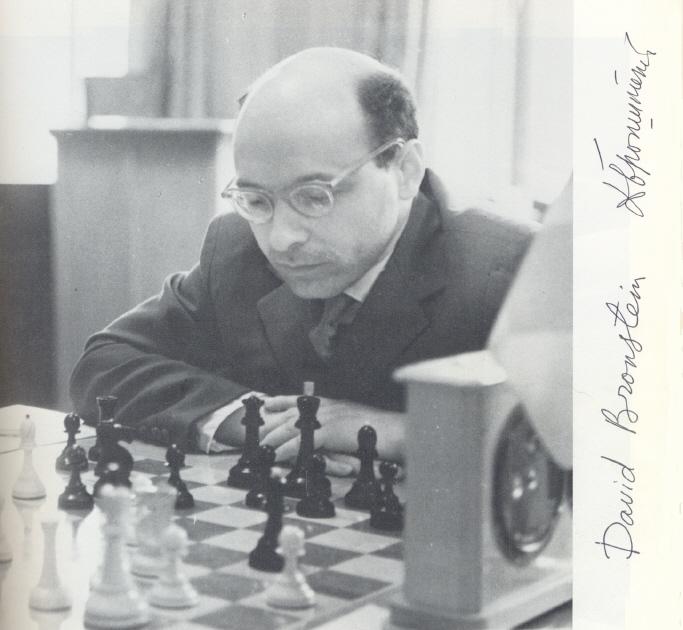
Edward Winter

See C.N. 4753 below.
***
From page 395 of Kings, Commoners and Knaves:
‘By not winning the title I have put a shadow on my chess career and it is a little sad that I have had to read and hear for more than 40 years that I am not a good player. It seems that all my other achievements in chess have been ignored.’
David Bronstein on page 108 of The Sorcerer’s Apprentice, which he co-authored with Tom Fürstenberg (London, 1995).
‘In every combination there is a piece which works harder than the others. The only problem is how to find this piece and put it to work!’
Ibid., page 61.
Bernd Graefrath (Mülheim an der Ruhr, Germany) points out this passage from page 57 of The Sorcerer’s Apprentice by D. Bronstein and T. Fürstenberg (London, 1995), concerning Wexler v Bronstein, Mar del Plata, 1960:
‘Before this game I had a friendly talk with our Ambassador to Argentina N. Alekseev and I promised him that I would try to win today with a queen’s sacrifice. And so I did!’
(2251)
From page 11 of The World Chess Championship: 1951 by W. Winter and R.G. Wade:
‘Like Bronstein, who drew in a simultaneous game against Capablanca at Kiev in 1936, Botvinnik came up against Capablanca in a simultaneous exhibition in 1925 …’
What is known about Capablanca v Bronstein?
(2373)
Genna Sosonko (Amsterdam) has kindly asked David Bronstein whether he once drew a game against Capablanca in a simultaneous display. Here is Bronstein’s reply:
‘I never played a simul game against Capablanca. I may have been present at the 1936 Kiev event but I certainly did not participate. It is possible that I did see Capablanca there, but if someone had told me that it was Bohatirchuk I would probably have believed him. At the time I was 12 years old and although I did already play chess I was more interested in soccer in those days.’
(2421)
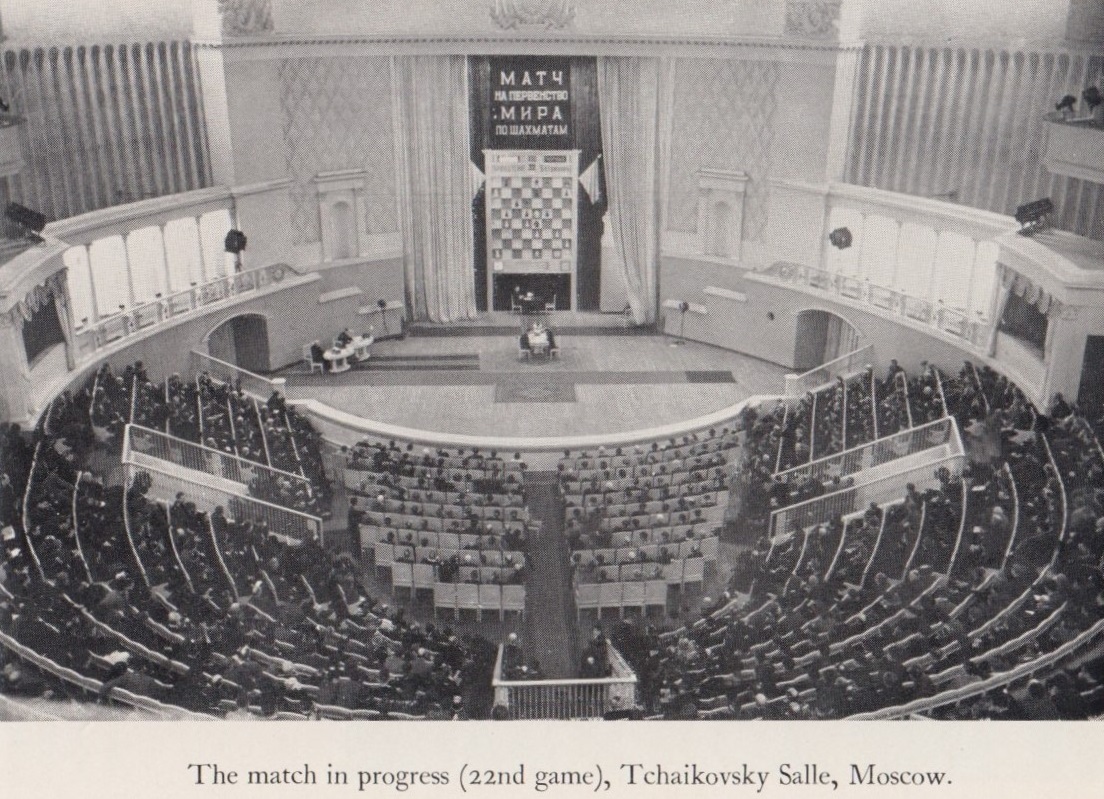
Photograph opposite page 54 of The World Chess Championship: 1951 Botvinnik v Bronstein by William Winter and R.G. Wade (London, 1951)
From Leonard M. Skinner (Cowbridge, Wales):
‘I came across a rather puzzling statement in David Bronstein’s book 200 Open Games (London, 1974). On page 16, in the preamble to a demonstration game (a King’s Gambit Accepted) against Petrosian, Tbilisi, 1963, Bronstein writes:
“As commander of the attacking army I chose as our subject one of the variations I had analysed in the well-known Keres attack and which I had once tested out on Alekhine himself.”
The suggestion that Bronstein (born in 1924) played the variation against Alekhine is not really credible. Can you throw any further light on the statement?’
It would appear to be a translation error. The text on page 22 of the Russian edition (Moscow, 1970) refers to a line of play which Keres, not Bronstein, played against Alekhine:
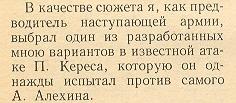
It may be recalled that Keres v Alekhine, Salzburg, 18 June 1942 began 1 e4 e5 2 f4 exf4 3 Nf3 Nf6 4 e5 Nh5 5 Qe2 Be7 6 d4 O-O 7 g4 fxg3.
(4210)
C.N. 4632 quoted from a column by G. Koltanowski on page 3 of Chess Digest Magazine, March 1969:
‘David Bronstein is known to take a long time before making his first move. In Berlin’s Lasker Memorial, he hadn’t yet made his first move when Vassikoukov [sic] mated Zaitzev at the 15th move.’
This refers to a tournament in 1968. Apart from the consideration that the mate in question would have come at move 16, not 15, we wondered what facts were available regarding the story. In C.N. 4639 Alan McGowan (Waterloo, Canada) responded:
‘The tournament book (Internationales Dr.-Emanuel-Lasker-Gedenkturnier 1968), published by the Deutscher Schachverband der DDR) shows that the game below (game 60, on page 61) was played in round eight:
Evgeny Vasiukov – Alexander Zaitsev
East Berlin, 25 November 1968
Caro-Kann Defence1 e4 c6 2 d4 d5 3 exd5 cxd5 4 c4 Nf6 5 Nc3 Nc6 6 Nf3 Bg4 7 cxd5 Nxd5 8 Qb3 Bxf3 9 gxf3 e6 10 Qxb7 Nxd4 11 Bb5+ Nxb5 12 Qc6+ Ke7 13 Nxb5 a6 14 Nd4 Nb4 15 Bg5+ Resigns.
The time used by each player is shown as 0.50 for White and 0.24 for Black.
The game Csom v Bronstein was played in the same round (game 61 in the book, also on page 61):
István Csom – David Bronstein
East Berlin, 25 November 1968
Caro-Kann Defence1 e4 c6 2 Nf3 d5 3 Nc3 g6 4 d4 Bg7 5 Be2 dxe4 6 Nxe4 Bf5 7 Ng3 Bg4 8 c3 Bxf3 9 Bxf3 Nf6 10 O-O O-O 11 Re1 e6 12 Bg5 Nbd7 13 Ne4 Drawn.
The time used by each player is shown as 0.50 and 1.00.
The introductory notes for the round give the following comments:
“K.o. im Caro-Kann
Mit Wasjukow – Saizew (Nr. 60) gab es die einzige Grossmeisterpaarung des Tages. Aber schon nach 74 Minuten gehörte diese Partie der Turniergeschichte an. Auf einer schachlichen Sprintdistanz über 15 Züge, die leider auch in diesem Wettstreit zur Remisspezialdisziplin erkoren wurde, kam Ewgeni Wasjukow als Sieger ins Ziel. Noch ehe die Kapitulation erfolgte, hatte es sich im Saal herumgesprochen: Saizew ist in zwei Zügen matt!! ‘Kaum zu glauben’, bemerkten Kiebitze. “Nicht solide”, meinte Grossmeister Flohr. Niemand hatte ein solches Ende ahnen können. Die Partie verlief bis zum 12. Zug in theoretischen Bahnen. Dann setzte Wasjukow ungewöhnlich fort (13 Sb5:). Auf unerschlossenen Pfaden galt es sich nun zurechtzufinden. Zwei Züge danach geschah bereits der tödliche Fehltritt (14...Sb4??), und Wasjukow fügte den Raritäten eine weitere Mattminiatur hinzu.
Allerdings fanden sie weit weniger Beachtung, weil die Würze hier nicht in der Kürze lag und manches überhaupt ohne Salz gekocht war. Csom – Bronstein (Nr. 61) zeigten die wenigsten Züge.”’
We are still seeking corroboration, or otherwise, of the statement by Koltanowski quoted in C.N. 4632.
See too Chess and Time.

The above inscription comes from page 125 of one of our copies of A Picture History of Chess by Fred Wilson (New York, 1981).
The late David Bronstein seldom gave interviews, but a substantial one with Antonio Gude appeared on pages 38-42 of the March 1993 Revista Internacional de Ajedrez. Bronstein expressed irritation that he was remembered for his world championship match with Botvinnik and his book on the 1953 Candidates’ tournament. Asked whether he had been under pressure to lose the former event, he stated that, although there had not been direct pressure, circumstances related to his father, the fact that he was a Jew, and a clear institutional preference for Botvinnik had resulted in psychological pressure; Bronstein considered that winning the match could have been very damaging for him, although that did not mean that he had lost intentionally. For the record we quote the full exchange on this matter:
‘Gude: ¿Qué me dice del match con Botvinnik? ¿Le presionaron para que usted perdiera?
Bronstein: No hubo presión directa, naturalmente. Pero existían circunstancias, como mi padre, un manifiesto opositor al régimen, que había estado varios años en prisión, mi condición de judío, la marcada preferencia institucional por Botvinnik, a quien se le veía como un modelo soviético de campeón ... Había la presión psicológica del entorno, y a mí me parecía que ganar podría perjudicarme seriamente, lo cual no significa que yo perdiera de forma deliberada ...’
Bronstein spoke of the influence of his father, a rebellious defender of democracy. ‘From him I inherited that trait: when I am forbidden to do something, I rebel.’
Concerning the book on the Candidates’ tournament, Bronstein revealed that much of the text was by Boris Vainstein (see C.N. 1949 on page 206 of Kings, Commoners and Knaves).
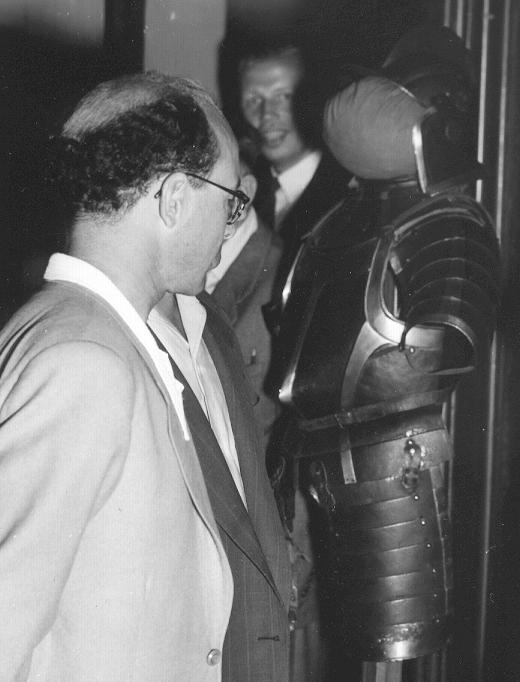
David Bronstein in Stein am Rhein, 1953
A quote by Bronstein used in the heading to the interview was ‘Chess is very easy’, his grounds for the statement being quirky:
‘If we remove from the board the queens and kings, and their corresponding pawns, we have four blocks of identical pieces (rook, knight, bishop and three pawns). Bearing in mind the simplicity of their moves, playing cannot be difficult. ... It is only necessary to follow the logical paths, forgetting about routine and stereotyped concepts. ... We are the ones who make chess complicated.’
Bronstein expressed regret that the Second World War had denied him a university education, adding that what little he knew he had had to learn on his own. He spoke warmly of Keres, a good friend and a quiet, courteous man who had, however, been accused of being a Nazi or a Nazi sympathizer. Bronstein acknowledged that Keres had played in tournaments in Germany and in occupied Europe, as well as fraternizing with German officials, but he called for understanding of the period and enquired rhetorically who was entitled to cast the first stone.
Asked why he went for long periods in the 1970s and 1980s without participating in chess events, Bronstein replied, ‘Because they did not invite me. And it is a very painful situation for a professional, believe me’. He added a detailed explanation of his absence from the 1978 USSR Zonal tournament in Lvov.
On a more personal level, Bronstein declared:
‘You have the impression that I am modest. I am not. I know that I am good, and even very good. Do you know why I like Leonardo da Vinci? Because he believed that for him nothing was impossible. I too believe that for me nothing is impossible in chess, so you can see that I am not as modest as you think.’
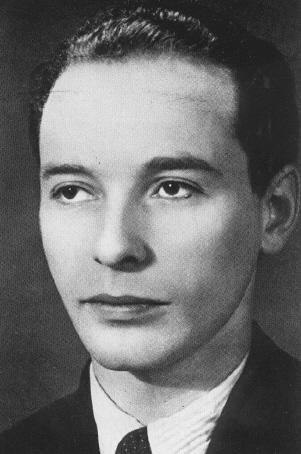
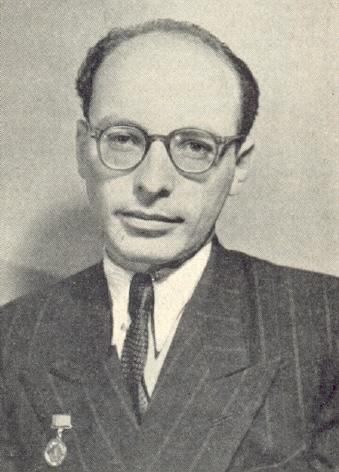
Among other questions put to Bronstein in the interview was ‘Who is your favourite player from the past?’ His reply:
‘Tartakower but, above all, Labourdonnais.’
(4753)
David Bronstein is barely recognizable in this photograph from page 32 of the November 1946 Chess Review:
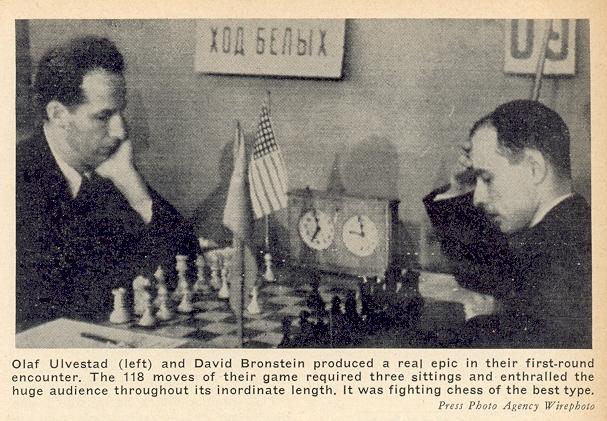
The game was played in the 1946 USA v USSR match:
Olaf Ulvestad – David Bronstein1 e4 c5 2 Nc3 Nc6 3 g3 g6 4 Bg2 e6 5 Nge2 Bg7 6 Nf4 Nge7 7 h4 h6 8 d3 d6 9 Bd2 Rb8 10 Qc1 b5 11 Nd1 a5 12 Ne3 a4 13 a3 Nd4 14 Qd1 Bb7 15 Rb1 d5 16 O-O O-O 17 Be1 dxe4 18 dxe4 Qc7 19 c3 Nb3 20 Qe2 Ba6 21 Kh1 Rb6 22 Rg1 b4 23 Qc2 bxa3 24 bxa3 Nc6 25 Rd1 Ne5 26 f3 Rfb8 27 Bf2 Qc6 28 Nh3 Na5 29 Rb1 Rb3 30 f4 Nec4 31 Nxc4 Bxc4 32 h5 e5 33 Rgd1 Qb5 34 Ra1
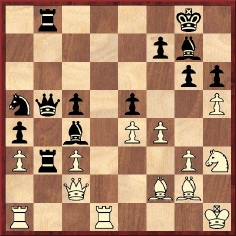
34...exf4 35 hxg6 Rxc3 36 gxf7+ Bxf7 37 Qd2 f3 38 Bf1 Qe8 39 Qd6 Nb3 40 Rab1 Rc8 41 Nf4 Rc6 42 Qd8 Rc8 43 Qh4 Qxe4 44 Rd8+ Rxd8 45 Qxd8+ Qe8 46 Qd6 Rc2 47 Nh3 c4 48 Re1 Qf8 49 Qb6 Nd2 50 Bc5
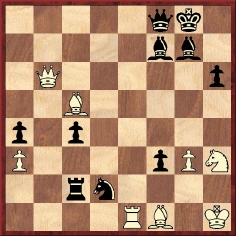
50...Nxf1 51 Rxf1 Qc8 52 Nf4 Rb2 53 Qa5 c3 54 Be3 c2 55 Bc1 Rb3 56 Kh2 Qc6 57 Qf5 Qb5 58 Qc8+ Bf8 59 Rxf3 Rxf3 60 Qg4+ Bg7 61 Qxf3 Qc4 62 Qg4 Qe4 63 Bb2 Bg6 64 Qc8+ Qe8 65 Qc4+ Qf7 66 Qc8+ Qe8 67 Qc4+ Qf7 68 Qc8+ Kh7 69 Bxg7 Kxg7 70 Qc6 Bf5 71 Qc3+ Kh7 72 Qc5 Qd7 73 Qe3 Qc7 74 Ne2 Qd7 75 Kg2 Bd3 76 Nc1 Bg6 77 Kh2 h5 78 Kg1 Qe8 79 Qc3 Qf7 80 Qe3 Kg8 81 Kg2 Qf5 82 Kg1 Qd5 83 Kh2 Bf7 84 Qc3 Qd1 85 Qe3 Bd5
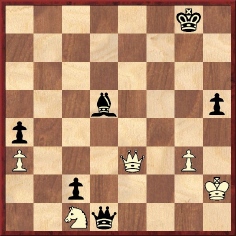
86 Qg5+ Kf8 87 Qh6+ Ke7 88 Qg7+ Kd6 89 Qf8+ Ke6 90 Qe8+ Kf6 91 Qd8+ Kg7 92 Qg5+ Kf7 93 Qf5+ Ke7 94 Qg5+ Kd7 95 Qg7+ Kc6 96 Qc3+ Kd6 97 Qf6+ Be6 98 Qf4+ Ke7 99 Qe3 Qd5 100 Qa7+ Bd7 101 Qe3+ Kd8 102 Qb6+ Kc8 103 Qa6+ Qb7 104 Qc4+ Qc6 105 Qd3 Qc5 106 Qe2 Kb7 107 Qd2 Bc6 108 Qe2 Qxa3 109 Qxc2 Qf3 110 Qb2+ Ka6 111 Qe2+ Qxe2+ 112 Nxe2 a3 113 Nc1 Kb5 114 Kg1 Kc4 115 Kf2 Kc3 116 Ke3 Bd5 117 Ne2+ Kb2 118 Kd4 a2 119 White resigns.
Has any master ever ventured to annotate this game in depth? Chess Review had just a brief overview:
‘Ulvestad played the opening poorly, allowing Bronstein to obtain a strong queen-side initiative. Despite ingenious and resourceful defense on Ulvestad’s part, his game went steadily downhill, and before the first adjournment he had lost a pawn. During the next sitting he lost another pawn, but despite gruesome time-pressure he managed to win back one of the pawns by a swindle. His ultimate downfall resulted from a weak 99th move.’
(4759)
We throw open a query from Pierre Bourget (Beauport, Canada) regarding the game D. Bronstein v B. Goldenov, Kiev, 1944 which is given in various databases as follows: 1 e4 e6 2 d4 d5 3 Nc3 Nf6 4 Bg5 Bb4 5 e5 h6 6 Bd2 Bxc3 7 bxc3 Ne4 8 Qg4 g6 9 Bc1 c5 10 Bd3 cxd4 11 Ne2 Nc5 12 cxd4 Nxd3+ 13 cxd3 b6 14 h4 h5 15 Qf3 Nc6 16 Bg5 Ne7 17 O-O Ba6 18 Rac1 Qd7 19 Qf6 Rg8 20 Rc3 Nf5 21 Ng3 Nxd4 22 Rfc1 Nb5 23 R3c2 Qd8 24 Qf4 Qd7 25 a4 Resigns.
However, our correspondent points out that this game has appeared elsewhere, and most notably in the later editions of The Golden Treasury of Chess by F. Wellmuth/I.A. Horowitz, as ending on move 24 with, in the words of that book, ‘one of the most amazing winning moves on record’:
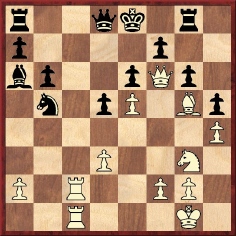
24 Rc8.
The Treasury gave the move three exclamation marks, but what is the truth about the conclusion to the game?
(4762)
C.N. 4863 asked about the first occurrence in a chess context of the phrase often attributed to Botvinnik, ‘Every schoolboy knows that ...’.
Taking up a lead from Norman Stephenson (Middlesbrough, England), who had a recollection of the remark in a UK chess magazine in relation to the game Botvinnik v Alexander, Munich Olympiad, 1958, we have found surprising passages in both CHESS and the BCM.
On page 30 of CHESS, 1 November 1958 P.H. Clarke wrote regarding round eight of the Olympiad finals:
‘England were beaten by the same margin as at Moscow [+0 =0 –4, as in the 1956 Olympiad]. Botvinnik won instructively.
All the Russians were horrified by Alexander’s 11th move, after which his game was strategically lost. Bronstein remarked, with some exaggeration, that every Russian schoolboy knows you must recapture with the pawn!’
C.H.O’D. Alexander annotated his loss on pages 30-31 of the January 1959 BCM, and below is a diagram of the position after 11 exf5, together with Alexander’s note on his reply, 11...Bxf5:
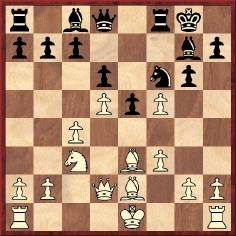
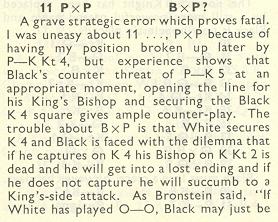
![]()
Alexander’s final words in this note are worth pondering:
‘As Bronstein said, “If White has played O-O, Black may just be able to afford BxP but if he has not it is fatal” – and every Russian schoolboy knows this!’
Were it not for what P.H. Clarke wrote in CHESS, we would automatically interpret the ‘schoolboy’ remark as Alexander’s own addition to the words of Bronstein which he had just quoted.
It is still unclear why the remark has been ascribed to Botvinnik. On page 113 of volume three of his trilogy Shakhmatnoe Tvorchestvo Botvinnika (Moscow, 1968) Botvinnik described 11...Bxf5 as ‘a typical strategic error in the King’s Indian Defence’ and stated that 11...gxf5 was forced, but made no reference to schoolboy knowledge:
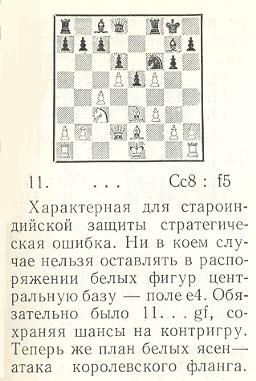
(4891)
From Leonard Barden (London):
‘I was in Munich in 1958, and my memory is that Bronstein made the “schoolboy” remark. It is the type of phrase characteristic of Bronstein but not typical of Botvinnik. I can dimly recall Alexander retailing the criticism, with some zest.’
(4896)
Hans-Georg Kleinhenz (Munich, Germany) writes:
‘A predecessor of the famous “every schoolboy knows” quote can be found in the Carlsbad, 1907 tournament book (page 287), where Georg Marco comments on the opening moves of Leonhardt v Wolf:
“Die bisherigen Züge sind jedem A-B-C-Schützen [a pupil in the earliest class at school, who is learning the alphabet] aus dem kleinen Dufresne bekannt.”’
We note that the English-language edition of the tournament book (Yorklyn, 2007) has a curious mistranslation:
‘These moves have been known to every beginner since the days of the young Dufresne.’
The phrase ‘kleinen Dufresne’ (‘little Dufresne’) has nothing to do with Dufresne’s age (or size). Marco was stating that the opening moves of Leonhardt v Wolf were well-known owing to their inclusion in Dufresne’s ‘little’ introductory manual (Kleines Lehrbuch des Schachspiels).
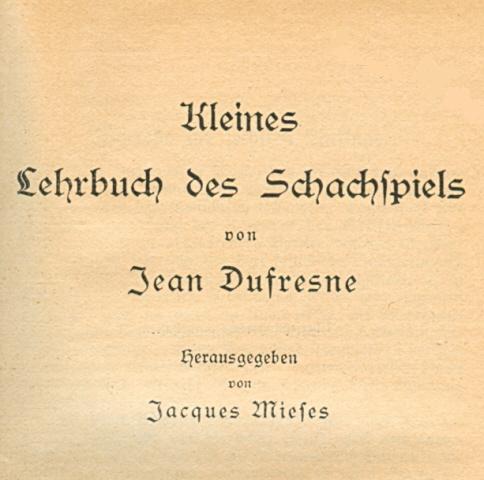
(5367)
As reported on page 331 of Kings, Commoners and Knaves, it was claimed on page 100 of The Sorcerer’s Apprentice by D. Bronstein and T. Fürstenberg (London, 1995) that during the Second World War Tartakower was several times ‘dropped by parachute behind enemy lines on secret missions’.
No evidence for the assertion has ever been traced, and now we note the following passage on page 278 of Moral Victories by David Lovejoy (Mullumbimby, 2008):
‘Bronstein subsequently told me that his source was a French journalist who talked to him many years earlier. Bronstein was inclined to doubt the story, but his editor insisted on including it for colour. (Telephone conversation with Bronstein, March 2006.)’
This appears in the book’s factual End Notes. Subtitled, ‘The Story of Savielly Tartakower’, Moral Victories is an historical novel (a 285-page paperback).
(5519)
Siegfried Hornecker (Heidenheim, Germany) asks whether it is possible to unearth the full score of the game Simagin v Bronstein, Moscow championship, 1947. The famous conclusion was:
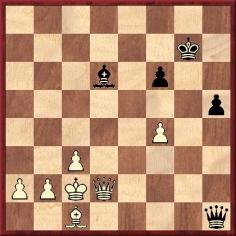
1…h4 2 Qxd6 Qg2+ 3 Kb3 h3 4 Qd7+ Kg8 5 f5 h2
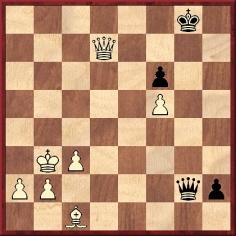
6 Bg5 h1(Q) 7 Qe8+ Kg7 8 Qg6+ Kf8 9 Qxf6+ Kg8 10 Qd8+ Kg7 11 Qe7+ Kg8 12 Qe8+ Resigns.
In no source, including books by and about Simagin, have we seen the complete game. Can it be traced?
(5746)
The hunt for the full game-score continues. Jurgen Stigter (Amsterdam) has forwarded to us pages 156-158 of the 6/1947 issue of Shakhmaty v SSSR, which included a crosstable of the Moscow, 1947 match-tournament and the moves of a draw between Simagin and Bronstein. However, regarding the game being sought, only the conclusion was published, with Simagin’s notes.
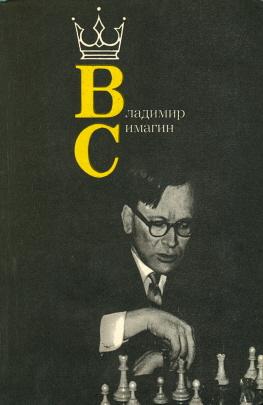
The front cover of the 1981
monograph on Vladimir Simagin by S.B. Voronkov
(5760)
Yakov Zusmanovich (Pleasanton, CA, USA) has sent us, courtesy of Sergei Voronkov, a photograph of David Bronstein’s grave, located in a cemetery (Чижовскоe) in Minsk, Belarus.
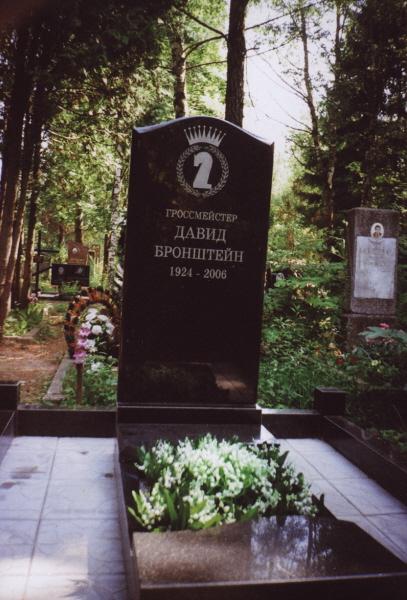
The photograph was taken by Bronstein’s widow, Tatiana Boleslavsky, who is the daughter of Isaac Boleslavsky.
(5859)
A famous game won by David Bronstein in a simultaneous display in Sochi in 1950: 1 e4 e5 2 d4 exd4 3 Qxd4 Nc6 4 Qa4 Nf6 5 Nc3 d5 6 Bg5 dxe4 7 Nxe4 Qe7 8 O-O-O Qxe4
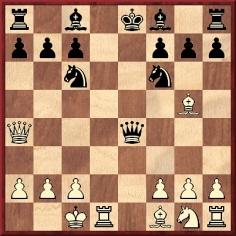
9 Rd8+ Resigns.
Can any more details be found about the occasion and Black’s identity? Moreover, to what extent was the game known before Bronstein published it on page 13 of his book 200 otkritikh partii (Moscow, 1970)?
(5945)
Caleb Wright (Ohauiti, Tauranga, New Zealand) asks for solid information about reports that the Soviet computer KAISSA helped David Bronstein in an adjourned game in 1975.
Firstly, we quote a passage from page 128 of How Computers Play Chess by D. Levy and M. Newborn (New York, 1991):
‘The first occasion on which a program’s ability to play certain endgames perfectly was useful to human players was at a Soviet tournament in 1975. There, in Vilnius, Grandmaster David Bronstein was able to use a database created by the KAISSA team to help him analyze an adjourned game, which he subsequently won. This was the ending of queen and knight’s pawn (g-pawn or b-pawn) against queen, the most difficult of all queen and pawn endings.’
Such an ending, we note, occurred in Bronstein’s game in Vilnius against Karen Grigorian. More details, from primary sources, of the computer’s involvement will be appreciated.
For other information on KAISSA, see chapter six of Chess in the Eighties by D. Bronstein and G. Smolyan (Oxford, 1982).
(6150)
A number of C.N. items have discussed the sales figures of chess books. An addition comes from page 202 of The Sorcerer’s Apprentice by D. Bronstein and T. Fürstenberg (London, 1995), in a text by Boris S. Vainstein originally published in the February 1984 issue of 64:
‘David Bronstein wrote first of all about chess as an art. His book International Grandmaster Tournament, (Candidates’ Tournament, Neuhausen/Zurich 1953, T.F.) of which more than 300,000 copies were sold in this country alone, is not a collection of chess games with commentaries but a real literary work.’
The passage is on pages 226-227 of the revised and expanded edition of The Sorcerer’s Apprentice (Alkmaar, 2009).
C.N. 1949 quoted some remarks made by Bronstein regarding the 1953 tournament book in an interview with Antonio Gude on pages 38-42 of the March 1993 issue of the Revista Internacional de Ajedrez:
‘Most of the nice words and elegant expressions in the book overall are the work of Vainstein, who writes very well ... Of course, the analysis and technical concepts are mine, as are the views on my rivals, but it may be said that a large part of the text is by Vainstein. Also, it is a book for which I do not have particular affection because it reminds me of a tournament that was very special in a negative sense. Things happened there that I should like to forget ... We shall discuss that another time. I do not wish to be more specific for the moment.’
For a subsequent, specific account (entitled ‘Thrown’ games in Zurich) see pages 131-137 of Secret Notes by D. Bronstein and S. Voronkov (Zurich, 2007).
(6592)
We own a Snowball Publishing volume dated 2012: Zurich International Chess Tournament 1953 by David Bronstein:
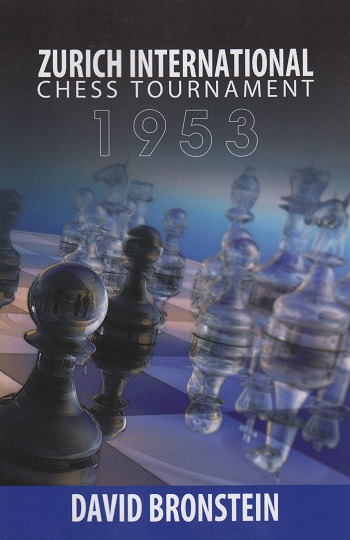
The name of the translator, Jim Marfia, has been retained on the title page, but the book is merely a low-quality reprint of what Dover Publications, Inc., New York brought out in 1979 (front cover below), with all reference to Dover removed.
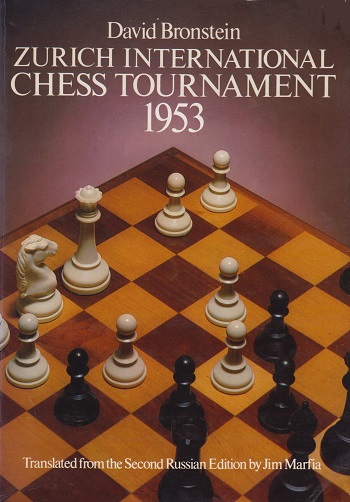
(10005)
‘Some time ago the great Russian player David Bronstein gave me this advice: “Look at the games of Gordon Crown. He really understood chess”.’
William Hartston, Now!, 6-12 February 1981, page 80.
(6742)
C.N. 2170 (see page 241 of Kings, Commoners and Knaves) gave our suggestion for the first game in which it is known how much time was consumed on the individual moves: Reshevsky v Alekhine, AVRO, 1938 (CHESS, 14 December 1938, pages 147-149).
Page 8 of CHESS, 21 August 1970 stated:
‘David Bronstein makes no secret of his admiration of our introduction of time records in CHESS in 1938 and 1939 in connection with games in the AVRO tournament.’
Courtesy of a 1968 issue of Soviet Weekly (does any reader have a copy?) CHESS gave the score of Bronstein v Larsen, Amsterdam (Interzonal), 1964:
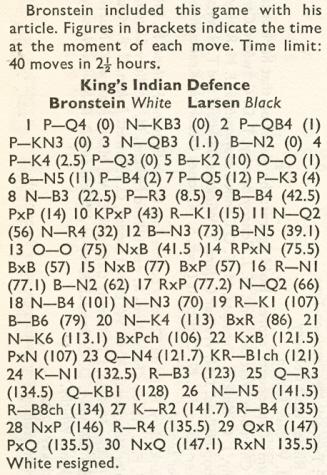
Detailed notes can be found on pages 65-68 of David Bronstein – Chess Improviser by B.S. Vainstein (Oxford, 1983) and on pages 84-91 Larsen’s Selected Games of Chess 1948-69 by Bent Larsen (London, 1970). The latter set of annotations refers on several occasions to the time taken on particular moves.
(7085)
The front of the dust-jacket of the original 1954 edition of Fred Reinfeld’s book How to Play Chess, with a shot of the famous game in which Alexander defeated Bronstein at Hastings:
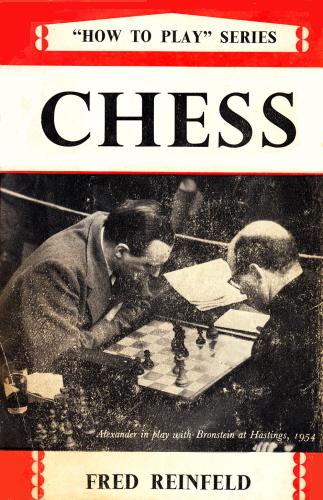
(7569)
The result was front-page news in the Manchester Guardian, 9 January 1954, as shown below, with, on page 10, a photograph in addition to further coverage:


One of a number of photographs contributed by Olimpiu G. Urcan (Singapore):
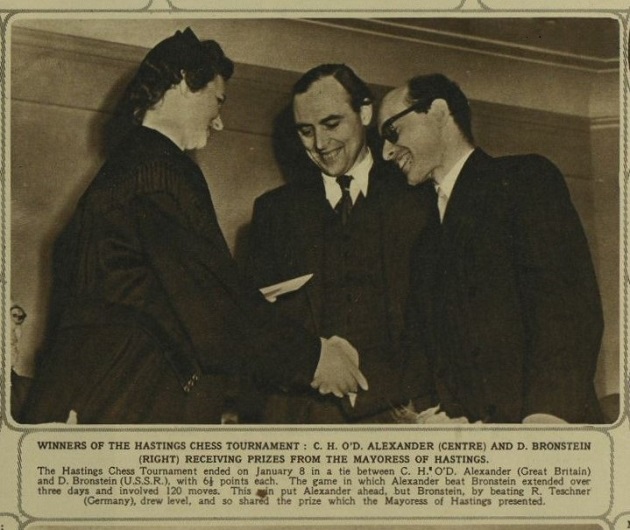
Illustrated London News, 16 January 1954, page 93
(9020)
From B.H. Wood’s column in the Illustrated London News, 30 March 1963, page 482:
‘I know of only one book devoted to the saving of lost positions; that is, not unexpectedly, by Fred Reinfeld, who must in the course of his lifetime have racked his brain to think what he could write about next. (His enormous output once prompted David Bronstein to remark that, whilst — — [Wood’s dashes] might possibly be the best writer of chess books in the English language, Fred Reinfeld was obviously the best lightning-chess-writer.) Illuminatingly, this book is one of Reinfeld’s very latest, showing clearly that it is one of the last subjects that even occurred to such a prolific writer.’
And from Wood’s column on page 114 of the 28 May 1977 issue:
‘It was Flohr, I think, who compared him [Golombek] with Reinfeld, who also wrote a great many chess books, describing Reinfeld as the world’s worst lightning chess writer, Golombek as the best (lightning chess is the term for chess played at an average of a few seconds per move). The assessment is hard on Reinfeld; Bob Wade has remarked again and again how poorer players find him helpful. It is kind to Golombek, whose books sometimes exhibit a smooth sameness, who had one rather egocentric period and who can find it difficult (who does not?) to avoid repeating himself.’
Is anything further known about the views attributed to Bronstein and Flohr?
(8364)
The front cover of Caïssa, 1 May 1950 has been forwarded by Alan McGowan (Waterloo, Canada):
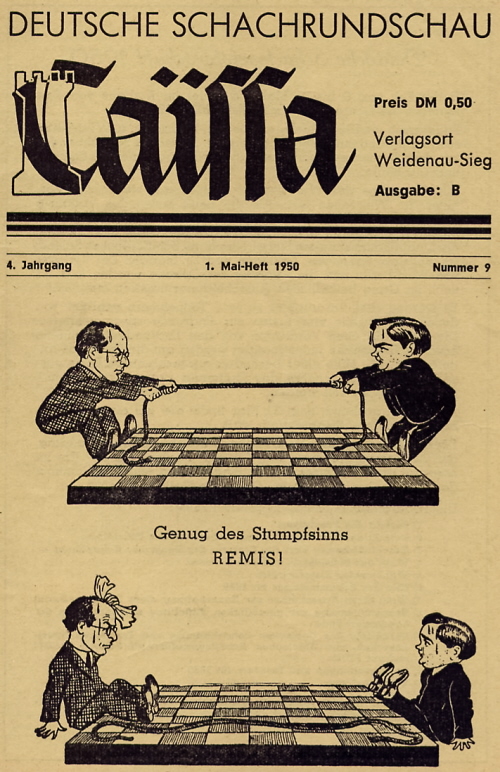
The magazine gave no explanation (concerning the context, for instance, or the rotation of the chessboard), but Mr McGowan notes that, as mentioned on page 129 of the issue, the Candidates’ tournament in Budapest was in progress. One of the games between Bronstein and Kotov was drawn in 15 moves.
(8437)
On pages 106-107 of the April 1963 BCM D.J. Morgan quoted K.F. Kirby’s description of 25 Qa3 as ‘perhaps the most remarkable and most unbelievable winning move in chess’:
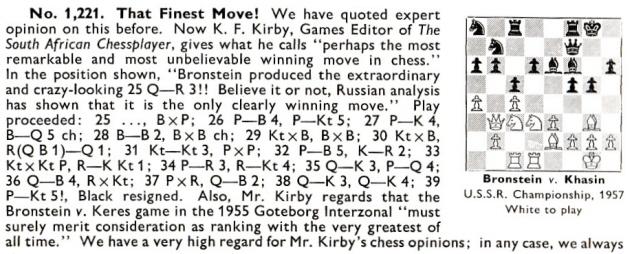
The position was also discussed by Irving Chernev on page 43 of The Golden Dozen (Oxford, 1976):
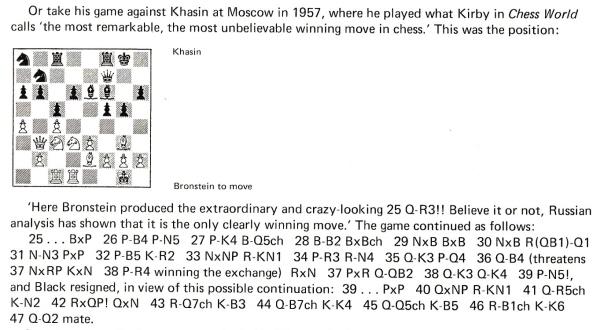
(8680)
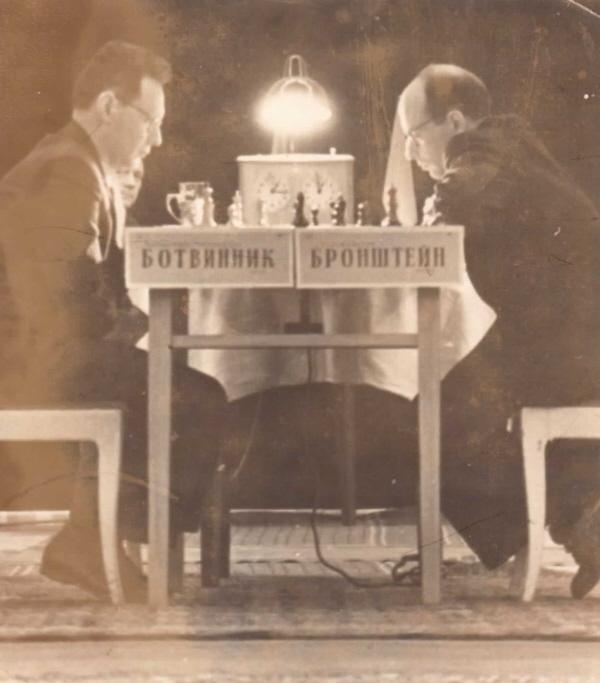
This photograph from the 1951 world championship in Moscow has been sent to us by Sergey Solodukhin (Saint-Branchs, France). He believes that it was taken by his father, Nicolai, in whose archives it was found.
(8870)
On page 13 of the January 1970 Chess Life & Review, in an article ‘Portrait of a World Champion’ by Leonard Barden, one of the exchanges with Spassky was:
‘Do you dream about chess?’
‘Only once. I was ill at the time. I caught a cold after a game with Averbakh in 1959 and in my fever dreamt I saw an enormous rook in front of me. This rook went from QR1 to QB1; it looked huge and terrible. But I have never dreamed up a complete game as Bronstein has done.’
The Bronstein game was published by J.S. Battell on page 225 of the August 1961 Chess Review:
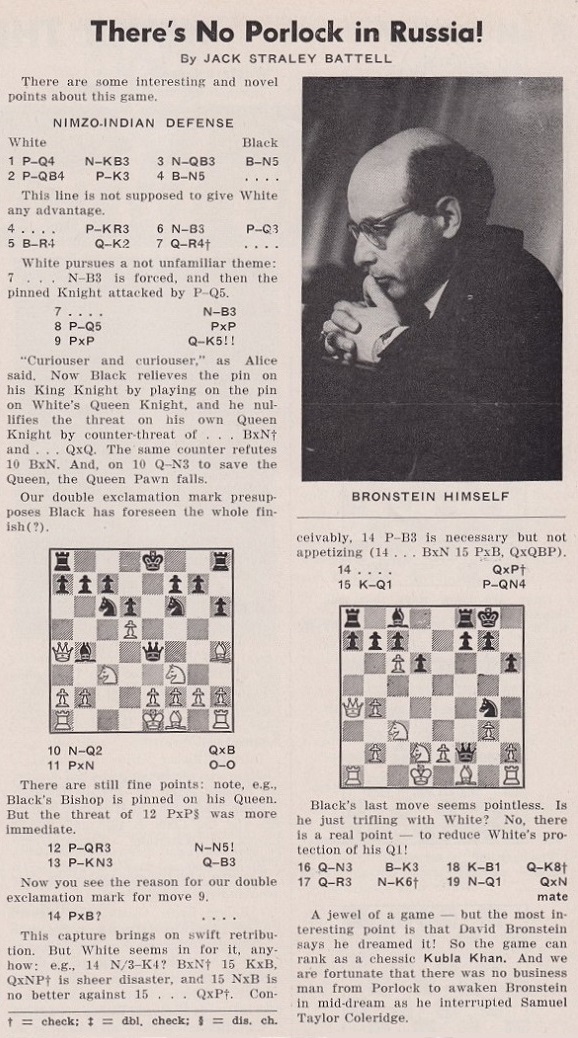
Wanted: more details about the game. It has become well known and was given (Bronstein v Bronstein, Moscow 1961) on page 142 of Wonders and Curiosities of Chess by Irving Chernev (New York, 1974).
Roland Kensdale (Aberdeen, Scotland) quotes from page 109 of The Sorcerer’s Apprentice by D. Bronstein and T. Fürstenberg (London, 1995) and page 117 of the revised edition (Alkmaar, 2009). A game between Bronstein and Boleslavsky, Moscow, 1950 began 1 d4 Nf6 2 c4 e6 3 Nc3 Bb4 4 Nf3 d6 5 Qb3, and at this point Bronstein wrote:
‘Many years ago, I think in 1960, during the Soviet Championship in Leningrad, I was thinking about my opening in the next game with Korchnoi. As he often played 1 c4 Nf6 2 Nf3 e6 3 Nc3 I decided to try 3...Bb4 and if 4 d4 then 4...d6. Then, using my fantasy, I was dreaming of a nice combination after 5 Bg5 h6 6 Bh4 Qe7! 7 Qa4+? Nc6 8 d5 exd5 9 cxd5 Qe4 10 Nd2 Qxh4 11 dxc6 O-O 12 a3 Ng4 13 g3 Qf6 14 axb4 Qxf2+ 15 Kd1 b5 16 Qb3 Be6 17 Qa3 Ne3+ 18 Kc1 Qe1+ 19 Nd1 Qxd1 mate.
After the tournament I gave a lecture in the Chigorin Chess Club and told the audience about this and used the expression “chess dream”. Later I read in a book that I saw this variation during my sleep!’
From page 287 of CHESS, June 1961:
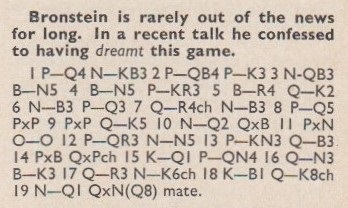
See also Chess and Sleep.
(9507)
From our collection:
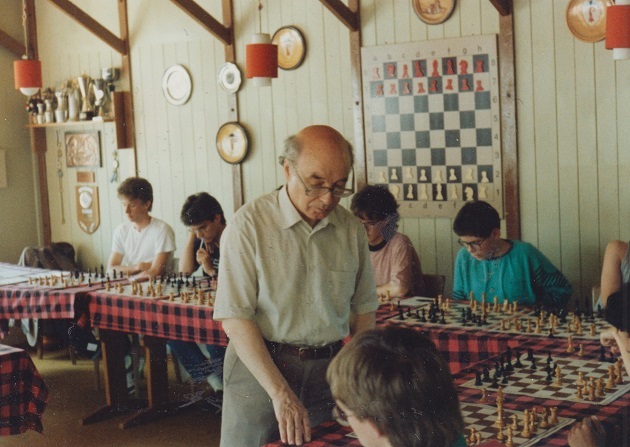
David Bronstein
(9507)
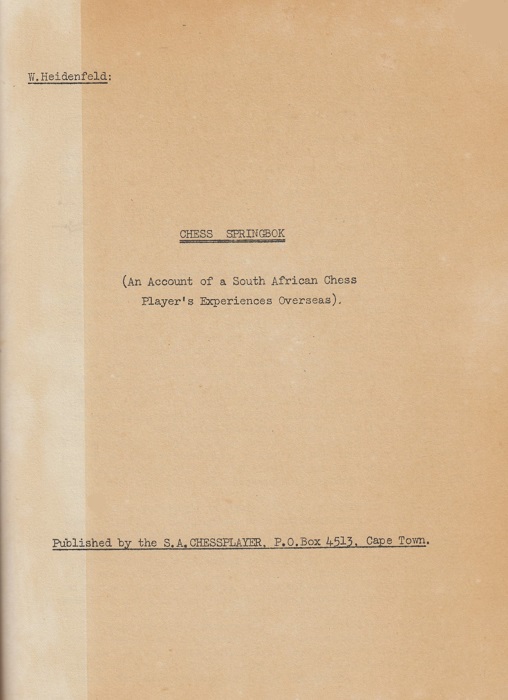
The four pages of plates include this photograph:
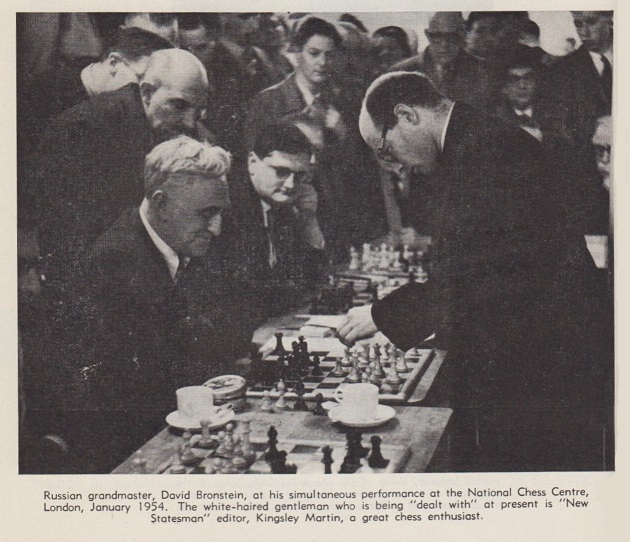
(10481)
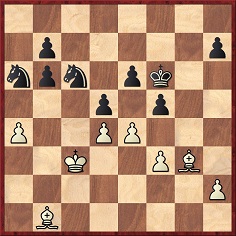
Black to move
From the 1951 Botvinnik v Bronstein match book by W. Winter and R.G. Wade, pages 32-33, the writer being Wade.
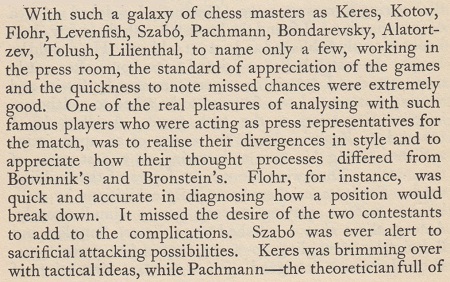
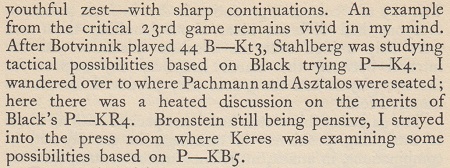
Bronstein did not play 44...e5, ...h5 or ...f4, but ...fxe4. The book (page 129) had no analysis or comment at that point in the game.
(11032)
Regarding the game Śliwa v Bronstein, the following is from an entry by Wolfgang Heidenfeld on page 148 of The Encyclopedia of Chess edited by Harry Golombek (London, 1977):

For ease of reference, the score as given in the Encyclopedia and, for instance, on page 47 of Chess Review, February 1958: 1 d4 f5 2 g3 Nf6 3 Bg2 g6 4 Bg5 Bg7 5 Nc3 Nc6 6 Qd2 d6 7 h4 e6 8 O-O-O h6 9 Bf4 Bd7 10 e4 fxe4 11 Nxe4 Nd5 12 Ne2 Qe7 13 c4 Nb6 14 c5 dxc5 15 Bxc7 O-O 16 Bd6 Qf7 17 Bxf8 Rxf8 18 dxc5 Nd5 19 f4 Rd8 20 N2c3 Ndb4 21 Nd6 Qf8 22 Nxb7 Nd4 23 Nxd8 Bb5 24 Nxe6 Bd3 25 Bd5 Qf5 26 Nxd4+ Qxd5 27 Nc2 Bxc3 28 bxc3 Qxa2 29 cxb4 Resigns. Some sources have a slightly different order for the opening moves.
Information will be welcomed on where Lauterbach wrote about the game and whether his term was, as may be expected, ‘Die Unsterbliche Verlustpartie’. Heidenfeld mentioned Śliwa v Bronstein on page 271 of the September 1965 BCM, calling it the ‘immortal loss’.
(11259)
George Kruger (Berlin) seeks further details regarding two matters mentioned in Not Only Chess by Gerald Abrahams (London, 1974):
On page 137 Abrahams described interviewing Lasker, Capablanca, Euwe, Flohr, Tartakower, Bogoljubow, Reshevsky and Fine for Tass during the 1936 Nottingham tournament. Can this material be found?
On page 203 Abrahams commented that Botvinnik ...
‘... was all but successfully challenged by a non-crypto-Jew, Bronstein (who later endeared himself to his masters by writing anti-Israel propaganda in the Russian press).’
Are such writings by Bronstein traceable?
(11920)
From Play the Tarrasch by L. Shamkovich and E. Schiller (Oxford, 1984), page 1:
‘We consider the Modern period to have begun when Bronstein was born – in 1924.’
(875)
See also Chess and Politics (The Bordell Case), which includes the following, from page 1 of the Daily Mail, 21 January 1954:

To the Archives
for other feature articles.
Copyright Edward Winter. All rights reserved.